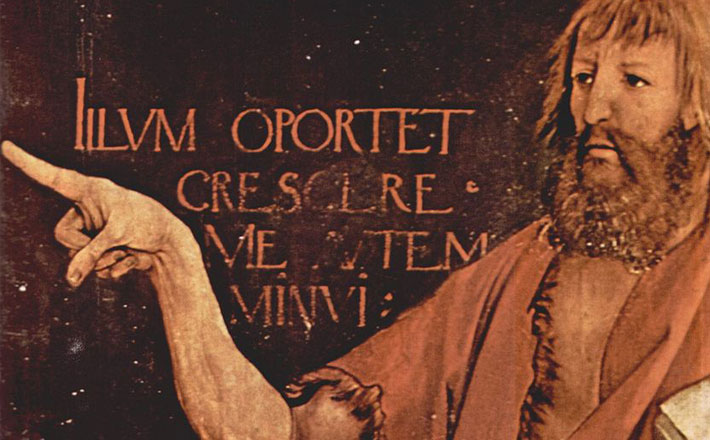Commentary on Psalm 126
If you have studied Greek and Hebrew, you know that they differ in more than just the alphabet and which direction you read.
Greek requires you to learn a complex host of verbal moods and tenses. Hebrew is much simpler, lacking pluperfects, perfects, participles, all those “p” things that bring clarity to when and how something actually happened.
Hebrew is so simple we lose some clarity, and nowhere more so than in Psalm 126. Has the Lord already restored Zion’s fortunes? Were we like dreamers once upon a time? Or are we pleading with the Lord to restore those fortunes? Are we longing for the day when our mouths will be filled with laughter?
In a strange way, it is always both. The Hebrew outlook on time, and certainly on God’s involvement down here, is like that Greek character Janus, looking forward and backward. As the Psalm says “The Lord has done great things for us, and we rejoiced” — but then is it better rendered “The Lord has done great things for us, and we are glad?” Yes. Back then God did things, God saved us, God acted definitively. That brought great joy: Miriam danced and sang with the people after the miraculous parting of the sea. But it brings great joy now, in worship, or just in the heart.
And it is that past that anchors us solidly enough to know what to expect of God in the future. Hope isn’t a wishing for a better tomorrow, and it isn’t a nostalgic longing for the return of the good old days. But if we understand God’s habits, God’s heart as shown in years gone by, we know what to look for, what to ask for, what realistically will come to be.
The Psalmist invites the people to be dreamers. But what can this mean? We have dreams at night, and Freud might analyze them and help us understand our anxieties that never go to sleep but dance in our heads all night long. We speak of a dream as a vision, as in Martin Luther King, Jr.’s “I Have a Dream” speech in Washington, D.C. in August 1963. That dream, incidentally, wasn’t some newfangled, recently hatched idea about what would be cool. King’s dream was old, bolted firmly in the past, America’s past, and even the Bible’s past.
But in the Bible, the “dream” isn’t our fondest hope or what rattles in our minds during sleep. Who dreamed? Joseph had a dream that his brothers would bow down to him. Pharaoh had dreams about sumptuous and then lean years. In the Bible, God reveals the future to the dreamer. It’s not fortune-telling, but a cracking open of the as yet unseen future so God’s people would know how to proceed, how to trust, how to live together in hope.
Complicated as the tenses might be, Psalm 126 is another National Lament, a huge corporate prayer of the people asking for dreaming, for a revelation of God’s good future. Because of the past, they can certainly imagine a stunningly glorious future, where the sad can’t stop laughing, where tears are dried and replaced with shouts of joy.
How intriguing: God doesn’t give the people a second chance, or how ever many opportunities to finally get things right. No, God gives them a dream, a visual pledge of what God will in fact do, period. And without pressing a poetic image into something literal, it is fascinating that the Psalm doesn’t say the tears will be exported to some distant place, and then joy will arrive. No, it is “those who sow tears will reap shouts of joy.” The tears become the joy. Somehow the joy grows out of the sorrow. The sadness is what births the laughter. It is hard not to think of Paul’s vision of eternal life as a seed falling into the ground and dying — and then the resurrected body springs up.
Or even Jesus’ primal parable about a sower. We hear his words about this extravagant sower who tosses seed just any old place. The weeds, rocks and path are trouble spots for the seed. If I think of my life as the sowing of some tears, I wonder: what kind of soil am I? Am I the kind of soil, the kind of person, who can laugh off adversity? Wrong question! It is the entire people of God who pray here, not just the chipper, optimistic, preternaturally buoyant people! God’s new life isn’t for the happily disposed. Because it isn’t a mood, after all. It is a reality. God’s restoration is political. It is a city, walls, buildings, with crops, people, rain, all the realities of life.
Some think this Psalm might be a prayer for blessing for the nation in the coming year. What would such a prayer look like for us? Singing “God bless America”? Or becoming those who dream, not of a powerful, bad news-free America, but a place of restorative justice, of mercy and hope for the hopeless, a place where sorrow isn’t shunned but embraced as the seedlings of new, glorious life. What are the words of that old hymn that agrarian folk probably resonated to better than we can? It may seem a little corny, but the plea is simple, practical, doable, and holy: “Sowing in the morning, sowing seeds of kindness … Waiting for the harvest … We shall come rejoicing, bringing in the sheaves … Sowing in the sunshine, sowing in the shadows, fearing neither clouds nor winter’s chilling breeze; by and by the harvest, and the labor ended, we shall come rejoicing … Going forth with weeping, sowing for the Master, though the loss sustained our spirit often grieves; when our weeping’s over, He will bid us welcome, We shall come rejoicing, bringing in the sheaves.”


December 14, 2014